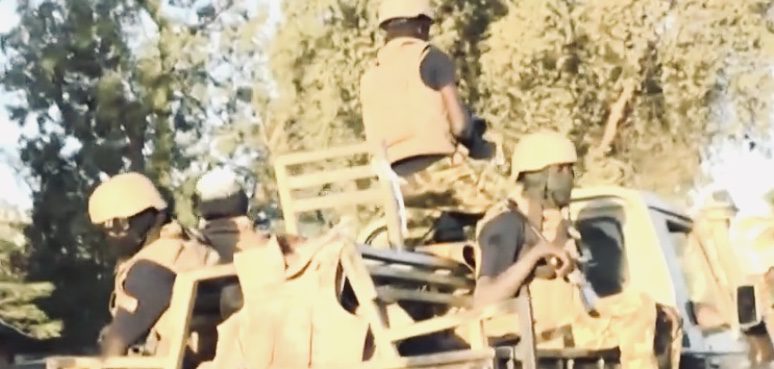Burkina Faso in a new military coup (Libya NATO debacle)
Kanako Mita, Noriko Watanabe, and Lee Jay Walker
Modern Tokyo Times

Burkina Faso
The Islamist insurgency in Burkina Faso is tearing the nation apart. Hence, after Lt-Col Paul-Henri Sandaogo Damiba took power, he promised to tackle the crisis. However, a new military coup just usurped power from Damiba.
Damiba said, after taking power, “In its history, our country has rarely been confronted with adversity. But more than six years now our people have been living under the yoke of an enemy that succeeded.”
Yet, the new military coup leaders became impatient with Damiba. Thus the army Captain Ibrahim Traore announced that Damiba had been deposed because of his failure to tackle the Islamist insurgency. Traore also suspended the transitional government. However, it remains to be seen if Damiba and his supporters will accept the new military coup – if they will form a collective front after negotiations – or if Damiba will be forced to flee the country?
The BBC reports, “Lt Col Damiba’s junta overthrew an elected government in January, citing a failure to halt Islamist attacks… But his administration has also not been able to quell the jihadist violence. On Monday, 11 soldiers were killed when they were escorting a convoy of civilian vehicles in the north of the country.”
Reuters reports, “It is a pattern that has become increasingly familiar in West and Central Africa in the past two years as Islamist insurgents wreak havoc across the arid expanses of the Sahel region, killing thousands and eroding faith in weak governments that have not found a way to beat them back.”
The new military coup leaders announced “Faced with the deteriorating situation, we tried several times to get Damiba to refocus the transition on the security question… Damiba’s actions gradually convinced us that his ambitions were diverting away from what we set out to do. We decided this day to remove Damiba.”
Libya and NATO powers
America hypocritically said it was ‘deeply concerned’ by events in Burkina Faso. However, it was America, France, and the United Kingdom, who destabilized Libya. The convulsions from the overthrow of Colonel Gadaffi are mass instability throughout the Sahel region, terrorist expansion, growing poverty after the regional economic power collapsed, tens of millions of internal and external refugees, and never-ending instability.
Internationally, the overthrow of Colonel Gaddafi in 2011 opened up many new Islamist ratlines that would blight the Sahel region and further afield. The destabilization of Libya (North Africa) – and with Boko Haram in Nigeria (West Africa) being intent on spreading Islamist terrorism to the Lake Chad region – meant al-Qaeda and others would utilize the situation. Therefore, nations involved in the overthrow of Colonel Gaddafi – notably America, France, and the United Kingdom – have assisted the Islamist cause by stealth.
Former President Barack Obama sanctioned the Libya debacle. The Boston Globe reported (2020), “That attack, in which the United States played a key role, may now be ranked among the most recklessly self-defeating military interventions of the 21st century. It was sold as “humanitarian intervention,” but wound up producing a human rights disaster. It turned Libya, once one of the most stable and prosperous countries in Africa, into a failed state and breeding ground for terror. In nearby countries, it has nourished a generation of murderous militias. The coup in Mali shows that after-effects of the Libya attack are still reverberating.”
The Institute for Security Services (2015) said, “The question of stabilizing Libya was the elephant in the room during a two-day high-level meeting on security held in Dakar, Senegal, in mid-December. Participants at the Dakar Forum, including heads of state from Senegal, Mali, Chad and Mauritania agreed that to stop terrorism in the Sahel something has to be done about the crisis in Libya, which has a spillover effect in the entire region. Libya now effectively has two parliaments and scores of militias are fighting it out for control of the capital, Tripoli, and the country’s lucrative oil fields. The crisis is, of course, the fall-out from the Nato intervention to oust former strongman Muammar Gaddafi in 2011.”
The domino effect of the Libya debacle is a major boost for Islamist terrorism and people traffickers. However, for regional nations, Libya soon became Mali – and Mali soon became Burkina Faso – and so forth. Thus NATO powers have a lot to answer for.
Burkina Faso
The new leaders – similar to Damiba – face an uphill struggle to contain the crisis because of the regional dynamics of this part of Africa. Several regional nations are blighted by ongoing Islamist insurgencies, ethnic divisions, political tensions, poverty, internal refugees, and limited infrastructures to tackle the needs of the people.

PLEASE DONATE TO HELP MODERN TOKYO TIMES
Modern Tokyo News is part of the Modern Tokyo Times group
DONATIONS to SUPPORT MODERN TOKYO TIMES – please pay PayPal and DONATE to sawakoart@gmail.com
http://moderntokyotimes.com Modern Tokyo Times – International News and Japan News
http://sawakoart.com – Sawako Utsumi’s website and Modern Tokyo Times artist
https://moderntokyonews.com Modern Tokyo News – Tokyo News and International News
PLEASE JOIN ON TWITTER
https://twitter.com/MTT_News Modern Tokyo Times
PLEASE JOIN ON FACEBOOK